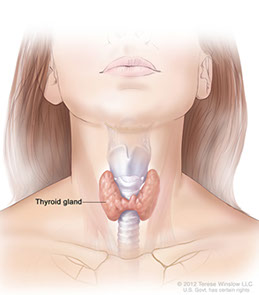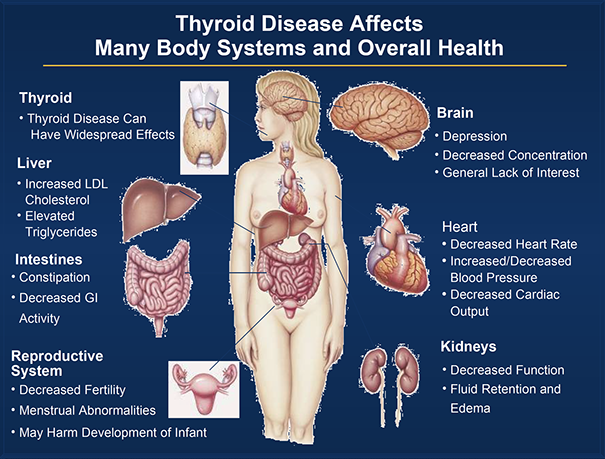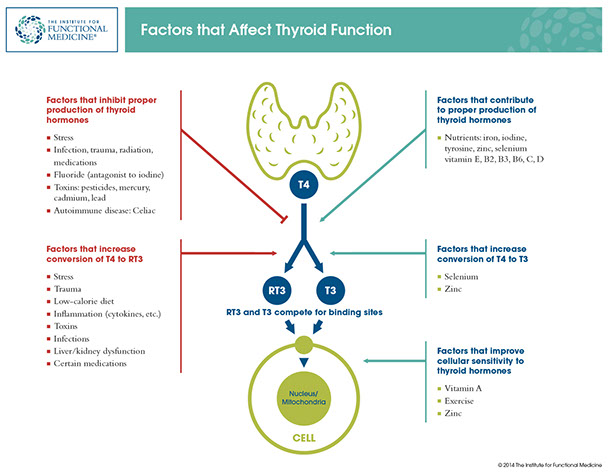Thyroid and hormonal dysfunction

Thyroid Health
Your thyroid gland is one of the most important organs in your body. Located at the base of your neck, the Thyroid gland produces three crucial hormones:
- Thyroxine (inactive T4)
- Triiodothyronine (active T3)
- Calcitonin
The Thyroid gland releases a continuous stream of these three hormones which affect the function of practically every cell and organ system in your body.
Thyroid hormones activities include:
- Determining your metabolic rate – which means the rate at which you burn fuels (including fat and sugar)
- Critical tasks of making proteins, extracting vitamins, producing energy from foods
- Critical to the production of other hormones
- Critical to the growth and development of the Nervous system
- The thyroid is often referred to as our thermostat as it maintains our body temperature.
The following diagram reviews the effects of thyroid hormones in the body

So what can go wrong?
Hyper and Hypo- Thyrodism
The thyroid gland is often likened to the accelerator of a car. Depending on how much pressure is applied, the speed of the car will increase or decrease.
Hyperthyroidism is akin to increasing pressure and speed, so the thyroid gland secretes too many hormones and can result in:
- Increased appetite
- Weight loss (but not always)
- Insomnia
- Sweating and heat intolerance
- Rapid heart rate or palpitations
- Anxiety/nervousness
- Fatigue and weakness
- Feeling Jittery
- Increased bowel movements/Diarrhoea
- Hair loss
- Prominent eyes (only in some Grave’s disease cases)
Hypothyroidism is like reducing the pressure and therefore speed causing the body to slow down from the reduction of hormone production and can result in:
- Fatigue
- Intolerance to the cold or feeling cold
- Weight gain
- Poor concentration and/or Brain fog
- Decreased memory
- Muscle weakness and cramps
- Joint and muscle aches
- Constipation
- Dry skin
- Depression
- Hair loss from the scalp and outer eyebrow
- Brittle hair and nails
- Irregular periods or excessive menstrual bleeding in women
- Decreased libido
- Increased cholesterol
- Reduced sweating with exercise
The immune system can also produce antibodies against the thyroid gland. This, in combination with other factors can result in autoimmune thyroid disease.
Hyperthyroidism resulting from an autoimmune disorder is known as Grave’s disease.
Hypothyroidism resulting from an autoimmune disorder is also known as Hashimoto’s disease.
Some clients with Hashimoto’s can experience a combination of both extremes as there may be irregular production of thyroid hormones depending on the damage to the thyroid gland.
What causes Thyroid Dysfunction?
There are many diet & lifestyle factors that can affect Thyroid function and cause dysregulation including:
- Nutritional deficiencies including Iron, Iodine, Selenium and Zinc
- Stress – the HPA axis (Hypothalamic-pituitary-Adrenal axis) is intimately linked to thyroid function. High levels of cortisol can reduce the activity of the enzyme that is responsible for the conversion of T4 to T3.
- Heavy Metals in the body
- Insulin Resistance. Conversion of T4 to T3 has been shown to be up to 50% slower with insulin resistance
- Autoimmune disease: Hashimoto’s and Graves disease result from immune activity directed towards the thyroid gland, its enzymes and receptors.

Assessing Thyroid Function
It is important to consider the whole picture when looking at Thyroid health.
During the consultation, we discuss all your symptoms and family history to provide a complete picture of your experiences. Dietary analysis, eating patterns and lifestyle factors can all contribute to your thyroid and overall health, including to stress and anxiety – which may impact your adrenal function, which may require support.
Functional tests can provide evidence of underlying dysfunction or pathologies.
Specific Thyroid markers I look for include:
- TSH, Free T4, Free T3, Reverse T3
- Anti-TPO, Anti-TG antibodies
Other markers that are important for Thyroid function include:
- Ferratin/Iron
- Vitamin D
- Adrenal gland function to determine cortisol levels via urine and/or Saliva
- B12, Iodine,
- Gut Health/Microbiome
- Heavy metals
- Food Intolerances
- Immune Reactions
Supporting Thyroid Function
It is important to understand if your need stems from
- A lack of nutrients that are the building blocks for producing the hormones
- Poor conversion of hormones or an inability to appropriately use them
- A complete deficiency of hormones
My focus is on ensuring your Thyroid health is supported by using a combination of an individual nutritional therapy programme, which is specifically designed to your personal needs, lifestyle suggestions and nutritional supplements if indicated.
I will help you identify the foods that will support your health and those that may be negatively impacting your condition, which will help support your body in resolving any dysfunction you may be experiencing.
BOOK AN APPOINTMENT
References:
Deepti, B. Babu, S. Kumar, H. et al. Undermined Part of Thyroid in Human Health, Journal of In Silico & In Vitro Pharmacology, 2016, 2:3.
BOOK AN APPOINTMENT
Please complete this form to get in touch or alternatively contact me here:
t: 07730 041268
e: sarah@pinehealthandnutrition.com





